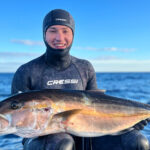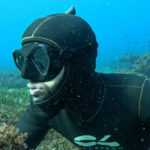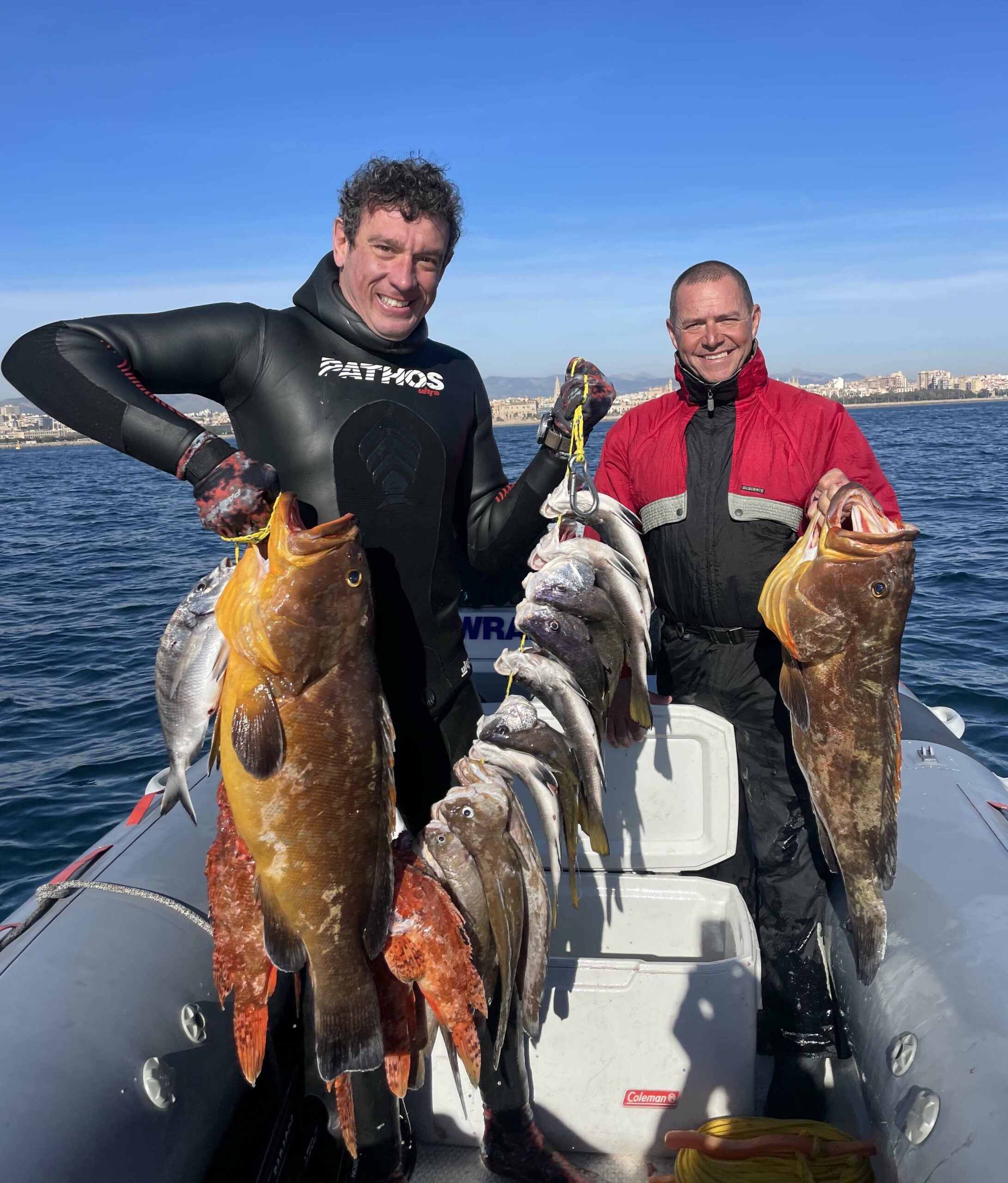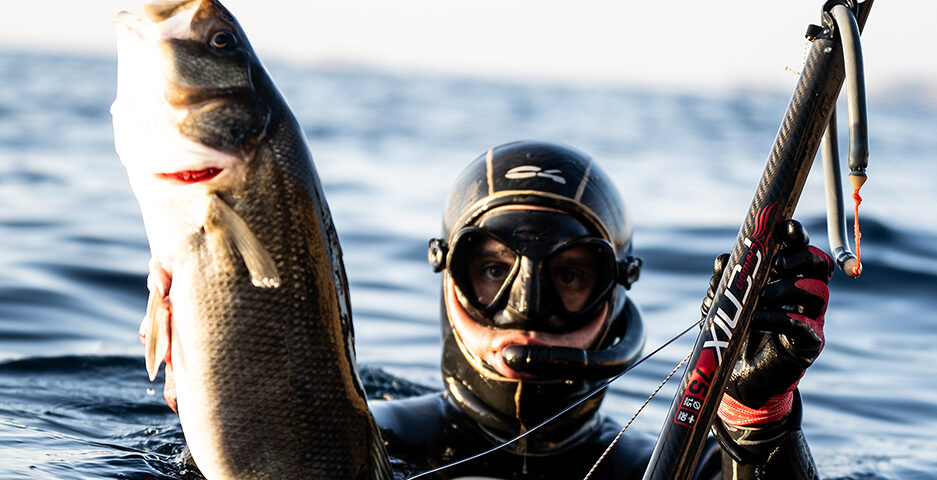But how much fish at the Palma Master!

Stefano Konjedic: remember this name!
11 December 2023
C4: Condor Mask
20 March 2024The competition took place in January, in Palma de Mallorca, and despite a superb performance, Giacomo de Mola had to settle for fourth place; the victory went to Oscar Cervantes. In the 50+ category (new this year), the Riolo/Loprete duo finished in second place behind
Gherardo Zei
The Palma Master took place in January, a classic event that attracts many champions to the island of Mallorca. This year, there was an interesting novelty: the 50+ category, reserved for athletes over 50 years old. It was a truly beautiful competition, very tight and excellently organized, in which, as usual, Giacomo de Mola participated, along with the duo Nicola Riolo/Raffaele Loprete in the 50+ category. We talked to them to hear how the competition went. Let's start with Loprete.
"This adventure began on Christmas Eve when a phone call from my friend Peppe Tortorella 'changed' my Christmas. I was on a train, heading to the airport to go to Spain for the holidays. A few days later, I received a call from Riolo and, still incredulous, also because Pedro Carbonell was present, I said yes to everything they proposed at the organizational level. Incredible. They were proposing for me to participate in the Master with them, with two legends of our sport. "Anyway, immediately after New Year's, we started physically preparing for departure and logistics. There were few days available, and a lot to do. Nicola arrived in Palma before me, but due to bad weather, he couldn't prepare the field. Sunday morning I landed in Palma after an endless journey and a sleepless night spent at Barcelona airport waiting for the connection. The adrenaline and desire were so high that by 9 o'clock on the same day, we were already in the water thanks to a break in the weather. Unfortunately, Nicola was unlucky because, due to a strong cold, he couldn't equalize and therefore gave up getting in the water. After another sleepless night, the first two days of preparation arrived with eight hours a day in the icy water. So, the start wasn't the best, and I had already exhausted my energy even before starting. But it's a Master, so as Masters, we have to behave. We gritted our teeth and continued, alternating phases of preparation. "The sea held up all week, and our bodies held up as well, by now 'frozen' in the wetsuit. The fish, however, tended to decrease as the competition approached, but we were as tough as determined to give our best and achieve a good result. At exactly 9 a.m. on Saturday, January 27th, the 6-hour competition started, but unfortunately, the first spots rich in prey turned out to be, alas, empty. For an hour and a half, we wandered in the total desert, without even having news of the opponents. We remained focused and, point by point, we carried out all the steps studied the night before without being distracted or discouraged by the disappointing start. "The catches began to warm our spirits, and the hope of doing well increased. The pace was good, and finally, we found the marked fish, and consequently, the confidence to make our presence felt. Sacrifices, cold, wind, and a lot of passion were finally not in vain. The competition ended at 3 p.m., and only then, peeking at the opponents' catch during the delivery on the pier, we realized that we had performed a miracle by overcoming all the misfortune in preparation and by making up for the lost hours during the competition. With much less than a fish of distance, we finished second; for me, it was a dream come true, surrounded by those legends who ignited and fueled my passion through magazines and their sporting achievements. As a competitor, however, I remain in debt to myself and my adventure companion for a missed opportunity, for which we are already planning to reach it in the next edition. "I thank my friend Lorenzo and his son Giuseppe who made their equipment and all their time available to us from the first to the last day: two angels. And I thank the immense Carbonell, who acted as our boatman; who could have imagined it?".
Giacomo de Mola
"I participated only in the individual Master, the most important competition. The strongest Spanish fishermen who fish in the Mediterranean were present. While the competition area was new and, unfortunately, different from the one where I managed to win twice in a row. Therefore, I had to start all over again, and it wasn't easy at all. "We arrived in Palma with some advance notice, but there was always rough sea that prevented us from preparing as we would have liked. However, we managed to do our best, and at the beginning, we immediately focused on searching for the heaviest fish, such as groupers, and then we moved on to search for whitefish (seabreams, seabasses, wrasses), and finally, we also looked for scorpionfish, which are always important. I must say that the coefficient for the grouper was set at ten kilograms, but large specimens were difficult to find. In fact, I didn't see any over seven/eight kilograms. However, I was aware that we could have a great competition because we had many spots for whitefish. In the last few days, I had even managed to locate the scorpionfish (which initially seemed to have disappeared) in a little zone where I thought I would close the species. Mirco Ominetti was helping me, and in the last two days, Oscar Lopez, a dear friend of mine and distributor of Pathos, also assisted me as a third person in the inflatable boat. "It was a difficult preparation. Only towards the end did I also manage to find a conger eel and some moray eels, but they were quite small fish, and I didn't rely much on them." "In the competition, I gave 110 percent. If we consider the Arbatax World Championship as something extraordinary, especially for the second day, I can tell you that here I did even more, so I can't complain about the result. In practice, I started on a six-kilogram grouper, on which I raced with the Frenchman Guillaume Eugene. It was at 38 meters, and I had a slightly faster inflatable boat than Eugene, so I arrived just before. I dived, and when I shot and pulled it out, he was next to the rock, waiting for me to make a mistake; it was a nice start! We surfaced together, then I moved on to some wrasses: there, going down with two spearguns, I managed to string two specimens in one dive (three dives, six wrasses!). After that, I moved to a spot with seabreams and a seabass, but they weren't there, but I caught a conger eel. "At that point, I wanted to move on to other seabreams and seabasses, but I had few scorpionfish stones, and my fear was that someone else would arrive at those signals. So, I immediately went to the scorpionfish, and there, at 44 meters, I caught four scorpionfish in two dives. Then it was the turn of a seabass.
Then it was the turn of a seabass. From there, I moved to a marked conger eel to close the quota of two specimens, but it had already been caught; maybe Cervantes had already been there. "Then I returned to the area where I had wrasses and seabasses. I was looking for spots where there were no other competitors. In that phase, I caught the eight-kilogram grouper. Even on this one, I did a nice 'number,' I went down with two spearguns since the area was of wrasses, and I left one outside. I went under the slab with the short one and the spear, but (surprise) instead of the wrasse, I saw the head of the grouper. At that point, I turned off the torch, came out, took the other gun, inserted it into the hole, and shot. I couldn't pull it out immediately; I had to go up and then down again to extract it. Right after, on the nearby rocks, I managed to hook a seabream and a seabass (a pair) and then another pair of seabasses. "We were almost at the end of the competition, and I moved to another spot, where I managed to catch two more seabasses. So, I had closed the quota of seven seabasses, seven scorpionfish, and seven wrasses. I also had a moray eel, a conger eel, and the two groupers. So I was quite satisfied. Not to mention that, after the competition, before returning to the port, we looked at each other with the other competitors, and we were almost certain we had won because we had more fish than anyone else and also two groupers, although not with a coefficient. So, even talking to Cervantes and Carbonell, we thought we had won. Then, instead, the mockery was that one of the seven seabasses was discarded (it was 470 grams), and therefore, in addition to the score of the lost fish, I also lost the bonus of the seabasses (2000 points). Also, the moray eel was discarded as it was one kilogram and eight instead of being two kilograms. Coming in, the moray eel would have given me another two thousand points. "From this, it can be deduced that the strategy was not wrong because, if the seabass had a few more grams, I would have won. Unfortunately, that's how it went, and looking better at the evaluations of the competition in general, I understood that the heavy fish were rewarded. In fact, I had seven scorpionfish for nine kilograms, while Oscar and Carlos (the first and the second) both had seven scorpionfish, but for thirteen and fourteen kilograms. That is, they caught huge fish that I didn't find. They probably lived in some "oasis" too difficult to locate in a few days of preparation. And Oscar and Carlos also caught big groupers, and here the same reasoning applies. They were specimens that were probably in some more isolated and difficult-to-find place. "In essence, I have nothing to complain about; I did my best with the knowledge I have of those places. I prepared for eight days in a new place, while they are at home. They had great skill, but also the advantage of knowing the competition area well".
A chat with the winner
Tell us how you prepared for the competition and how you fished.
"The truth is, I prepared little. I had three days available, and I divided my time between the Master and the Pepe Amengual trophy, which was held in a different area. But basically, I focused on a single bathymetry, between 38 and 43 meters, while I completely excluded the shallow area. I competed throughout the race with the quick-release belt with 12 kilograms of lead".
When did you realize you had won?
"It wasn't clear to me until the weighing operations were over. It was a really fought championship; as the hours passed, I saw that I had a good catch rate, but the truth is, it's hard to know if you'll win or not. You have to wait for the scale!".
Before leaving, who were you most afraid of?
"Obviously De Mola, he is a very strong and very consistent fisherman".
Next appointments?
"The European Championship in Turkey, scheduled for this year, while I don't know where the World Championship will be held in 2025”.
Do you like competing in Turkey?
"I don't know the seabeds, but I'm curious to go there. It should be a place with many fish, so it will be fun".
It's been a few months since you switched to C4/Dessault. First impressions of the team and what struck you the most?
"The first impression is that the equipment is incredible. Excellent quality throughout the range, pleasant to use, and very high-performing. The product that impressed me the most was the MB001 fins; it was love at first sight, the best fins I've tried in my entire career".



